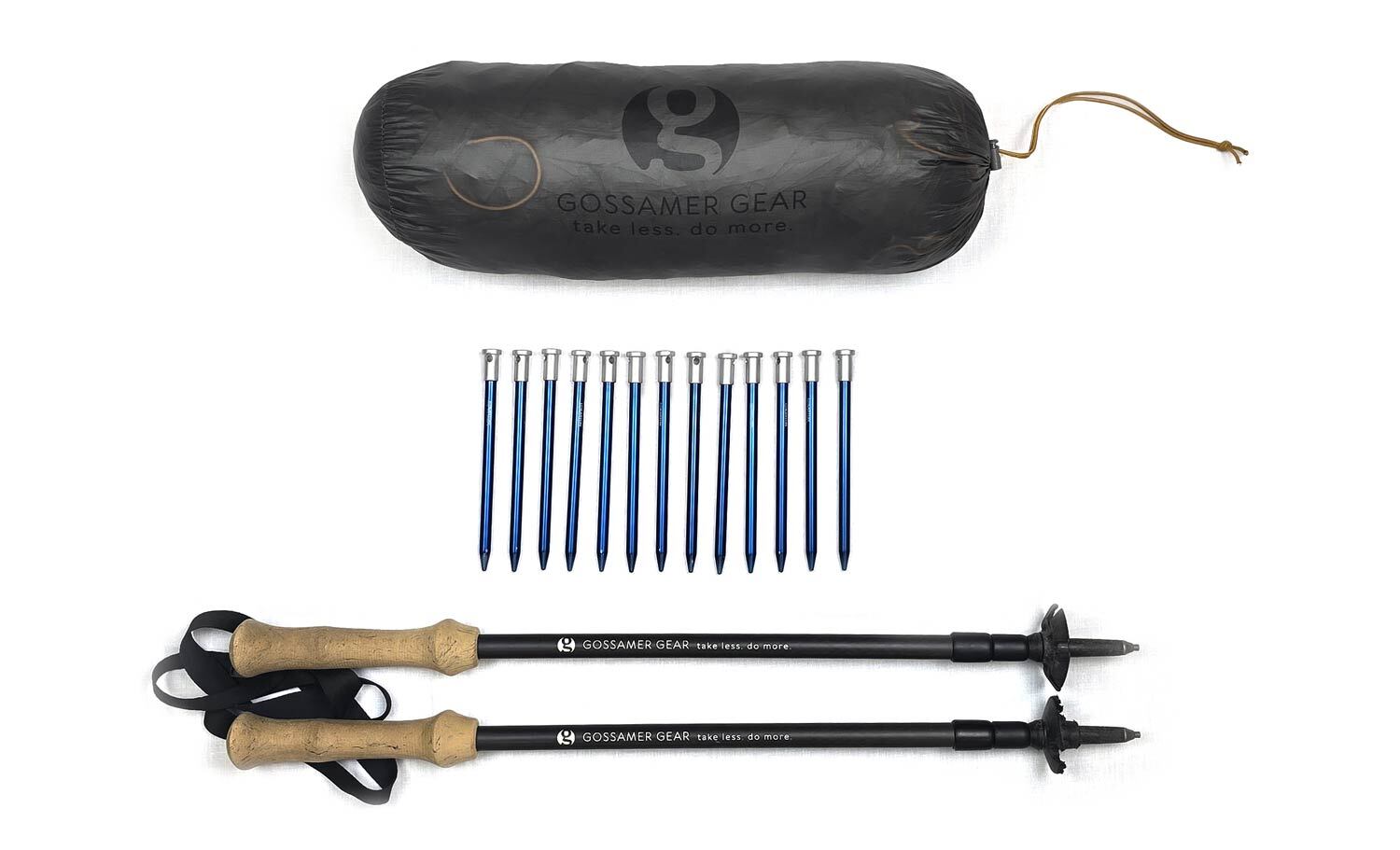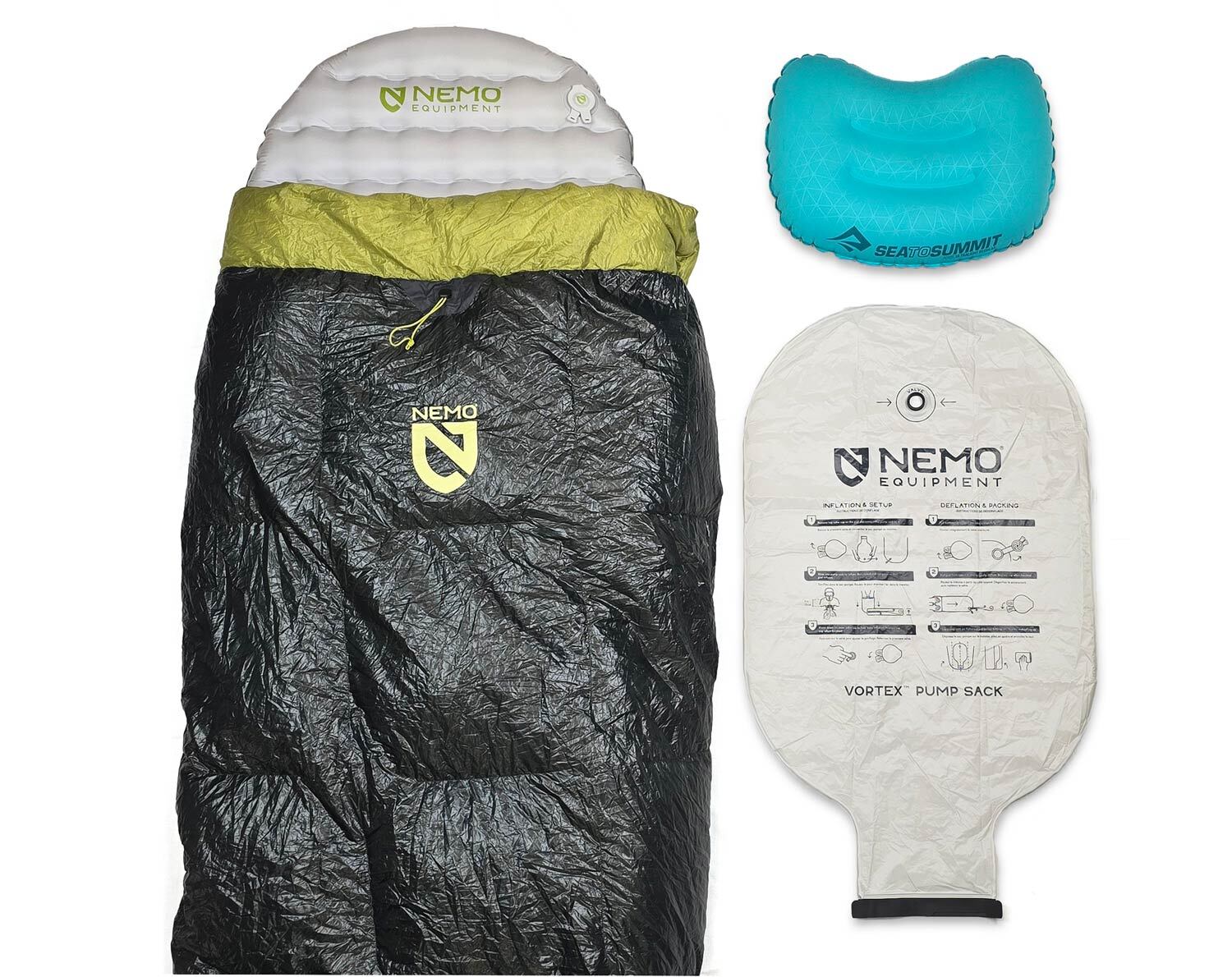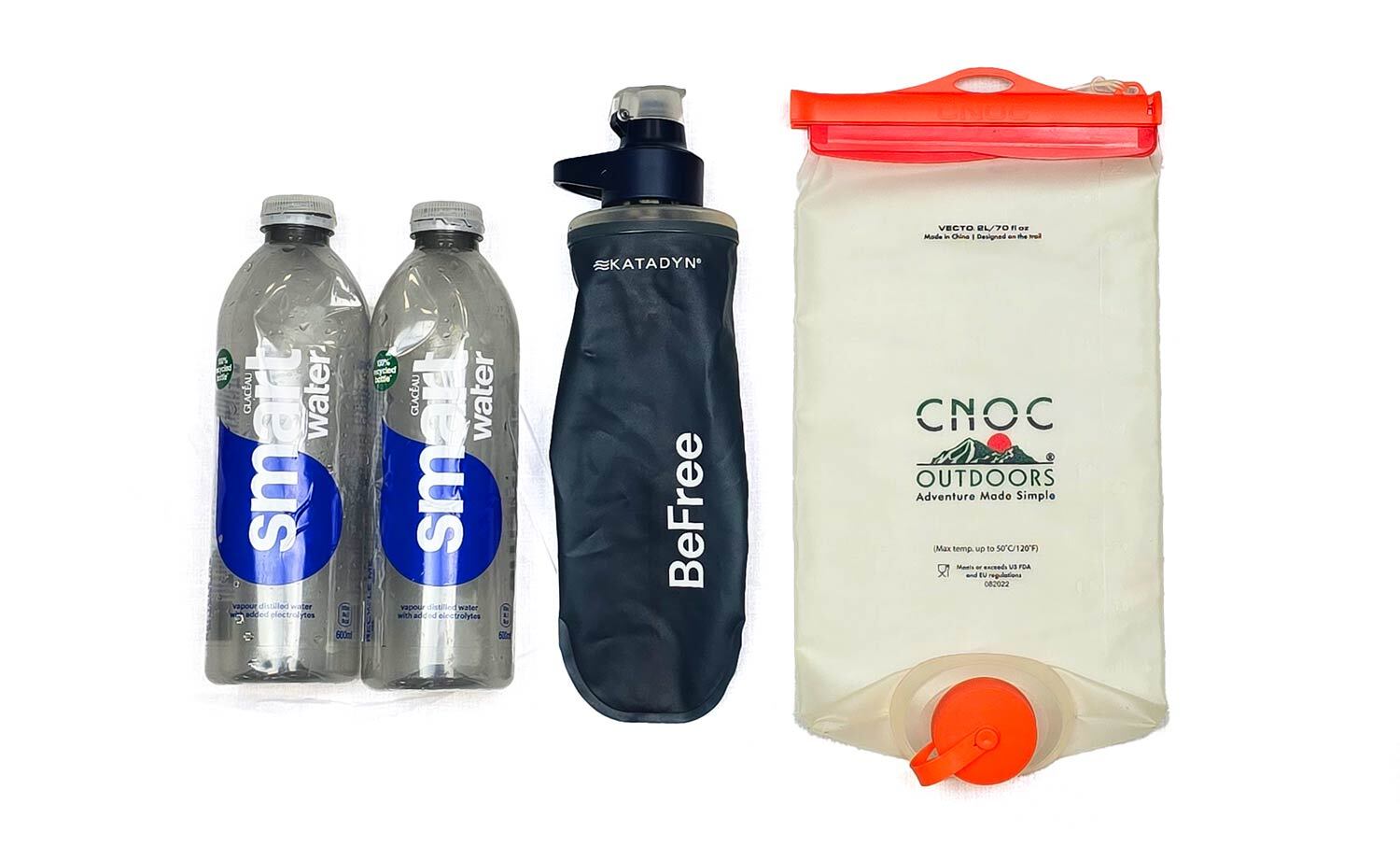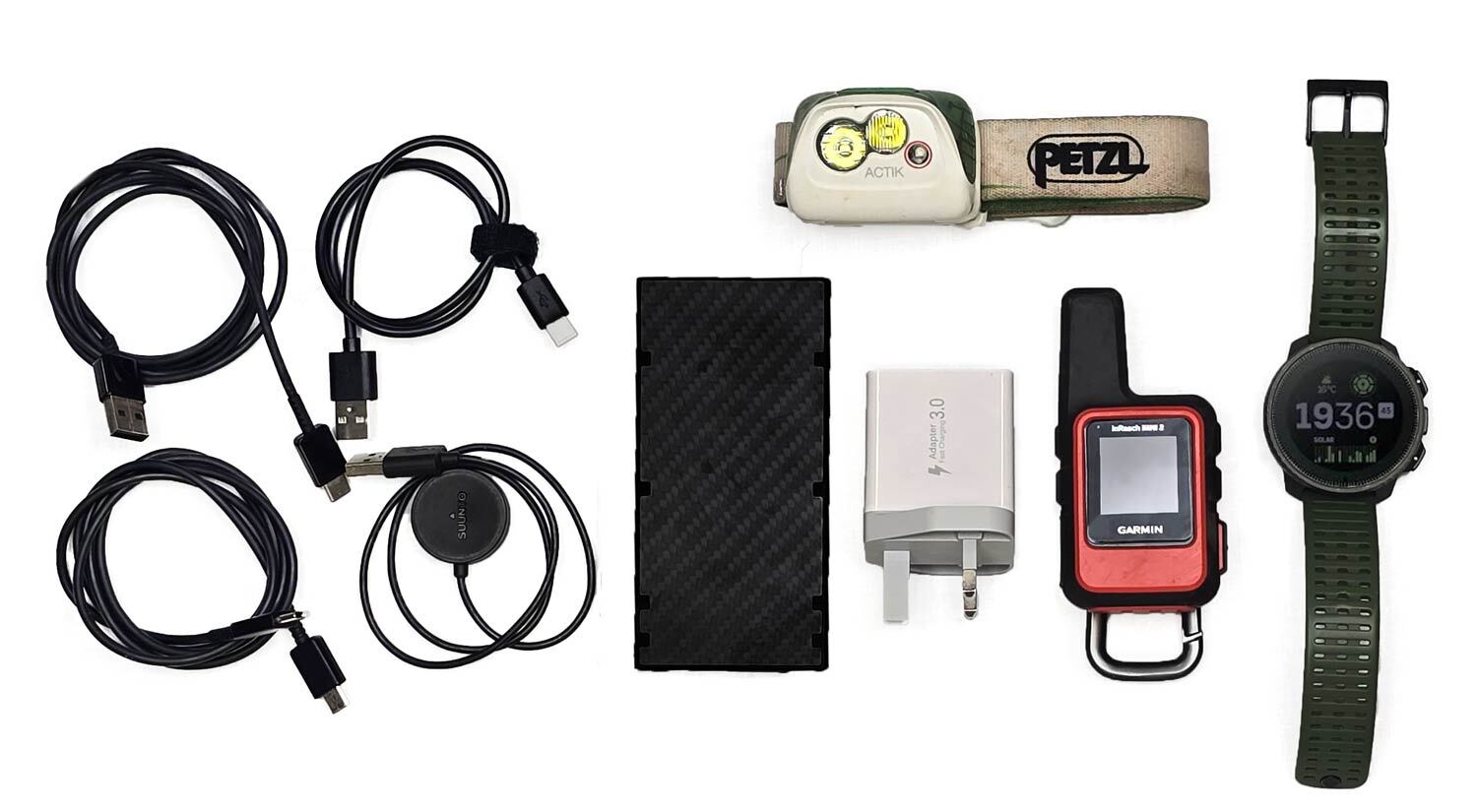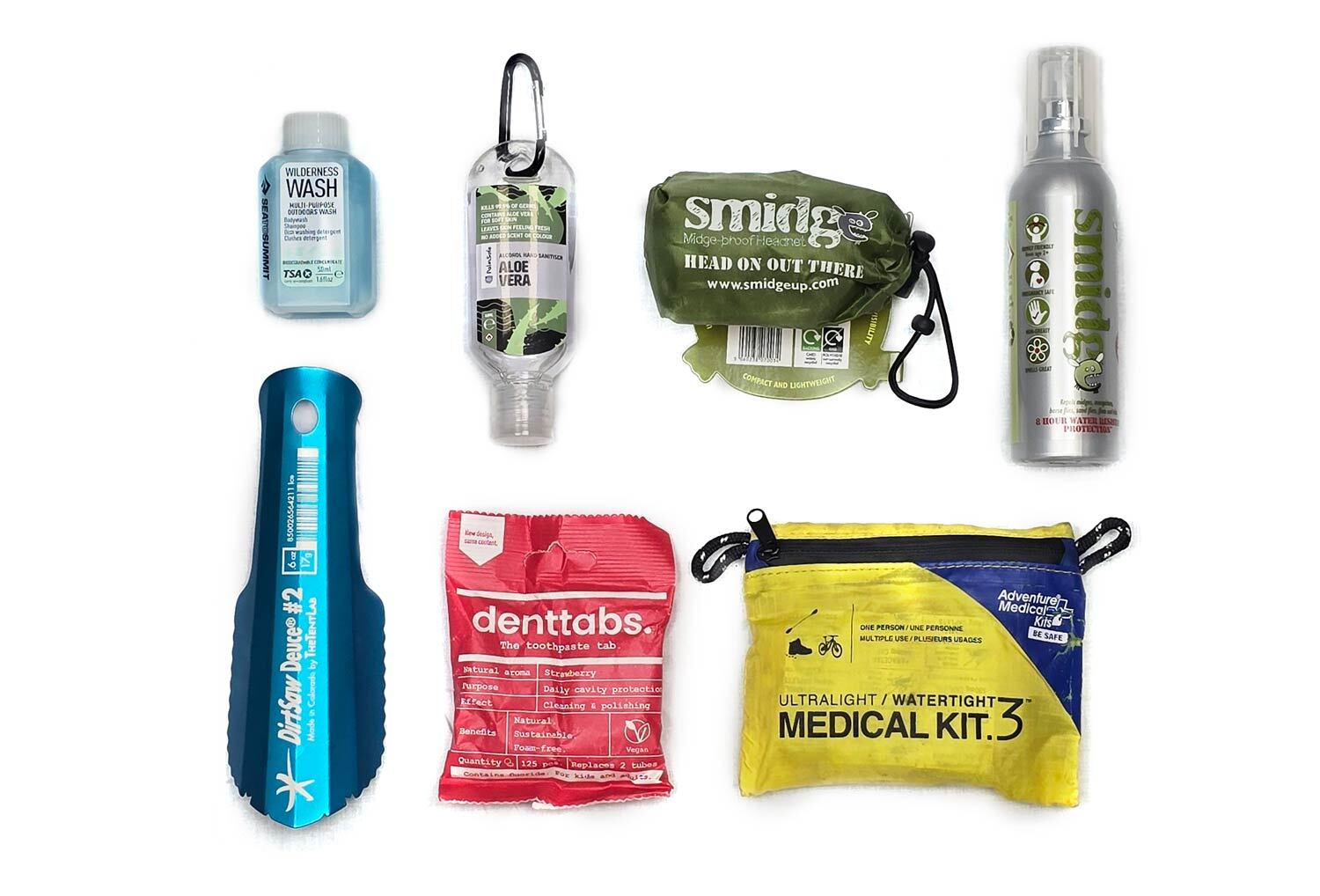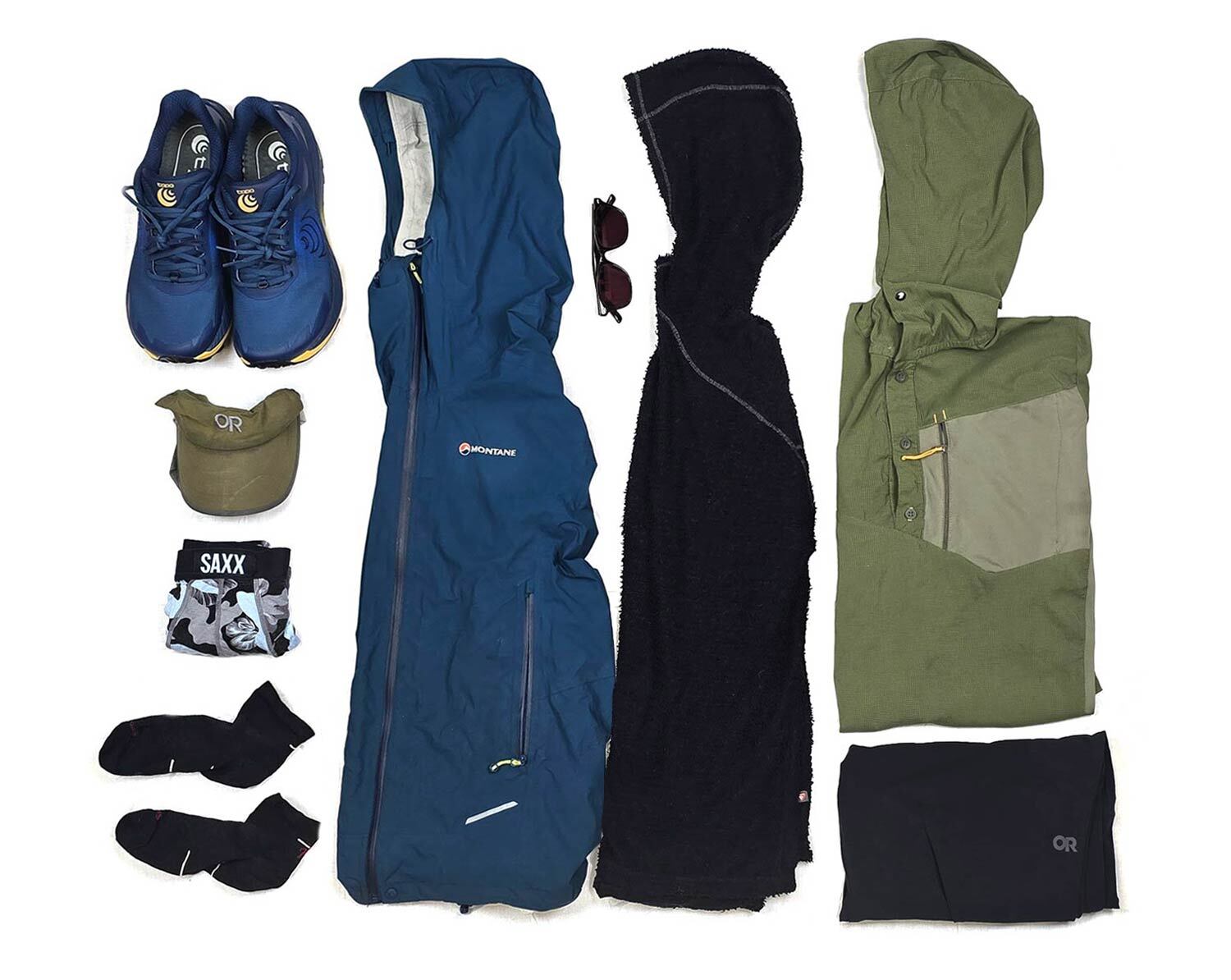Ultralight Kit for the West Highland Way: My 5.7kg Setup for a Summer Through-Hike
Posted by Andy Neil on Jul 17, 2025

Eight years ago, I first hiked the West Highland Way. Since then, I’ve clocked up thousands of miles on trails all across the UK, learning, refining, and stripping back my kit with each trip. So, returning to the Way this summer, I’m walking it with more experienced legs and a much more dialled-in, ultralight setup.
For a full, itemised breakdown of my kit, including weights and categories, jump to it here.
I'll be walking the traditional route over six days this July, averaging between 12 and 19 miles a day, with an additional summit of Ben Nevis planned for day seven. I know what you’re thinking, July, midges, what am I doing? In our (soon to be updated) West Highland Way guide, I’ve previously said: “The ferocity and abundance of midges is enough to put people off attempting the walk in the height of summer. Many, myself included, plan their trips to avoid these times; therefore, May and September are two of the most popular months to attempt the walk.”
And yet, here I am. The opportunity arose, and I took it.
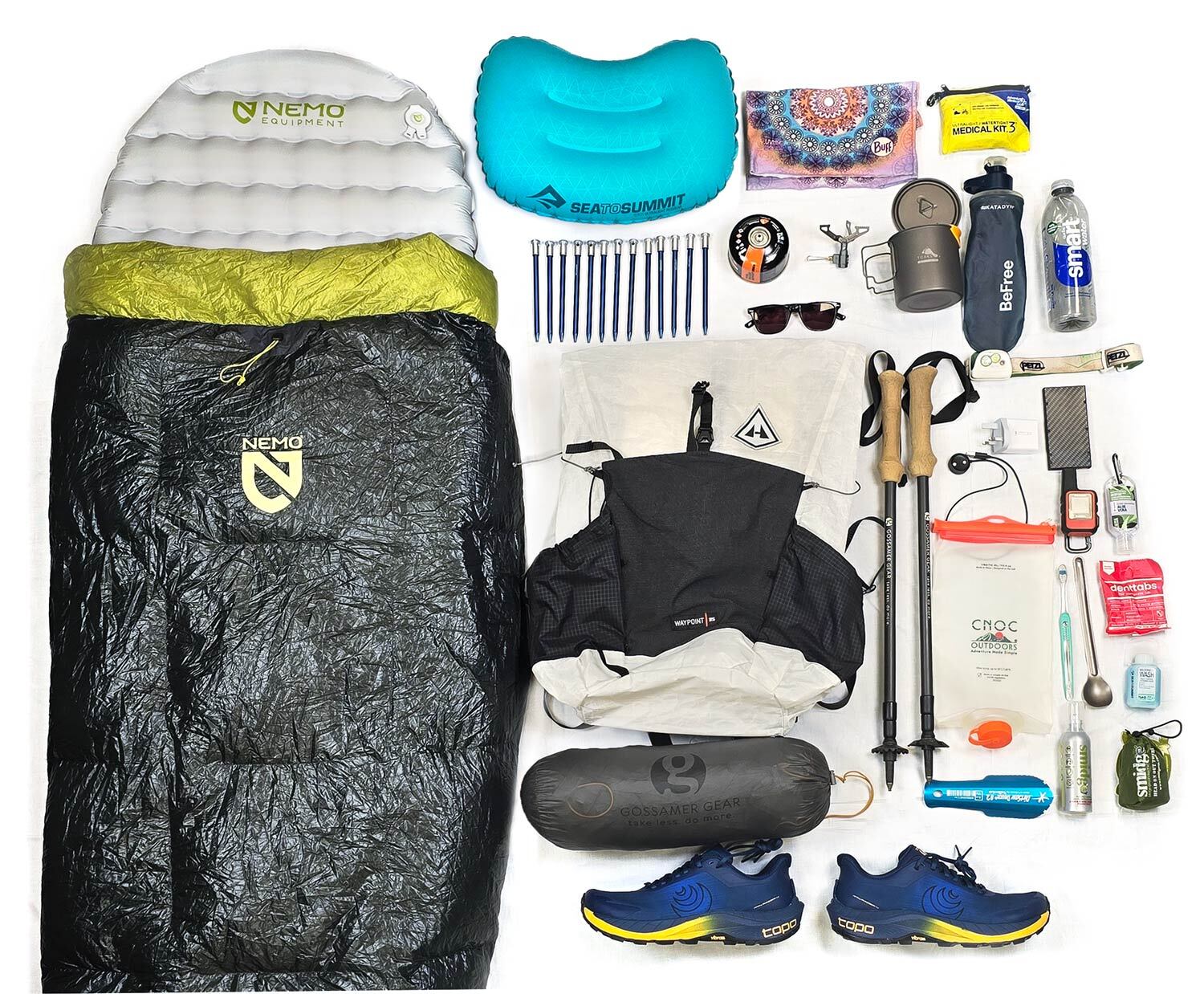
I’ll be walking with my mate, Brian, my American TGO partner. We plan to wild camp every other night, with booked accommodation in between, allowing us the luxury of recharging our batteries (both physical and electronic) every second day. This kit list is built with that rhythm in mind.
It also takes into account the (arguably over-developed) infrastructure along the West Highland Way. With frequent opportunities to top up on food and water, there’s no need to carry days' worth of supplies on our backs. I’ll be carrying just two dehydrated breakfasts, two dehydrated main meals, and snacks to cover the gaps. When we hit a pub or shop, we’ll use it.
Navigation will be handled primarily via my Suunto watch, backed up on my phone, and a Harvey Maps West Highland Way physical map, which is my go-to for UK trails. That said, the route is well-marked throughout, so navigation shouldn’t present any significant challenges.
This is a minimalist ultralight setup. While it’s built around my upcoming West Highland Way walk, it’s intended as a practical reference for anyone looking to fine-tune their kit, whether you're planning the WHW, another UK trail, or simply trying to cut weight without cutting corners. If you're looking for a clean, dialled-in kit list built on experience and real trail use, I hope this gives you a solid starting point.
Rucksack — Total Weight: 686g
Hyperlite Mountain Gear Waypoint 35
Arguably the most important item on any kit list. I’ve opted for the Hyperlite Mountain Gear Waypoint 35, as I wanted to keep things fast and light while still enjoying the benefits of framed support and a load-bearing hipbelt. The hipbelt pockets are perfect for easy access to essentials, such as snacks and my headphones.
The Dyneema construction is incredibly durable and highly water-resistant, keeping my gear dry without needing extra waterproof stuff sacks for items like my quilt. It’s a minimalist pack with just enough structure, ideal for this kind of trip, where I’m aiming to keep my pack weight as low as possible.
Shelter — Total Weight (incl. stakes & poles): 1,082g
Easton Nano 6" Tent Stakes (x12) — 96g (8g each)
Light, strong, and tough enough to be hammered into hard ground with a rock without showing a dent. These are my go-to stakes for most trips.
Gossamer Gear LT5 Carbon Trekking Poles (3-piece) — 302g
These double as my tent poles, but of course, they'll also be used on the trail, especially on ascents and descents. I expect they'll spend some time stowed, especially while scrambling over the roots and rocks along Loch Lomond.
They're incredibly lightweight and have held up over hundreds of miles. While I usually prefer lever locks over twist locks, and have recently been leaning toward Z-style poles, I’ve chosen these for their comfort in hand and minimal weight. Realistically, they'll spend most of their time on my pack, not in my hands, so weight wins out over packability here.
Sleep System — Total Weight: 929g
NEMO Pulse UL 20/30 Down Quilt — 545g
I used this on the Pennine Way in March, and it did a fantastic job of keeping me warm when fully cinched down and secured to my mat. For this summer trip, I’m looking forward to using it more like a blanket. It’s warm, comfortable, and impressively packable, making it a solid all-rounder for UK summer hikes.
Sea to Summit Aeros Ultralight Pillow (Regular) — 54g
A classic in the ultralight world, light, comfy, and reliable. I usually slip my baselayer over it at night to help secure it to my mat and stop it from wandering.
NEMO Tensor Elite Sleeping Mat (Regular Mummy) — 268g
I'll be honest, I usually prefer big rectangular mats, as I'm a bit of a sprawler. But in the name of cutting grams (and testing gear for a living), I’m giving this lighter, more compact option a proper go. It’s ridiculously light for a full-length mat. If I were heading out on a longer trip, I’d likely bring something roomier, but for a week on the WHW, this feels like a good trade-off. (Hopefully, a wide version is coming soon.)
NEMO Tensor Elite Pump Sack — 62g
I’m not against an electronic pump, but for a week-long trip, it’s just one more thing to keep charged and dry. That’s why I tend to reach for a pump sack instead. The Vortex pump sack from NEMO is, in my opinion, the best on the market, and the ultralight version included with the Tensor Elite adds barely any weight, well worth carrying.
Cook System — Total Weight (incl. canister): 349g
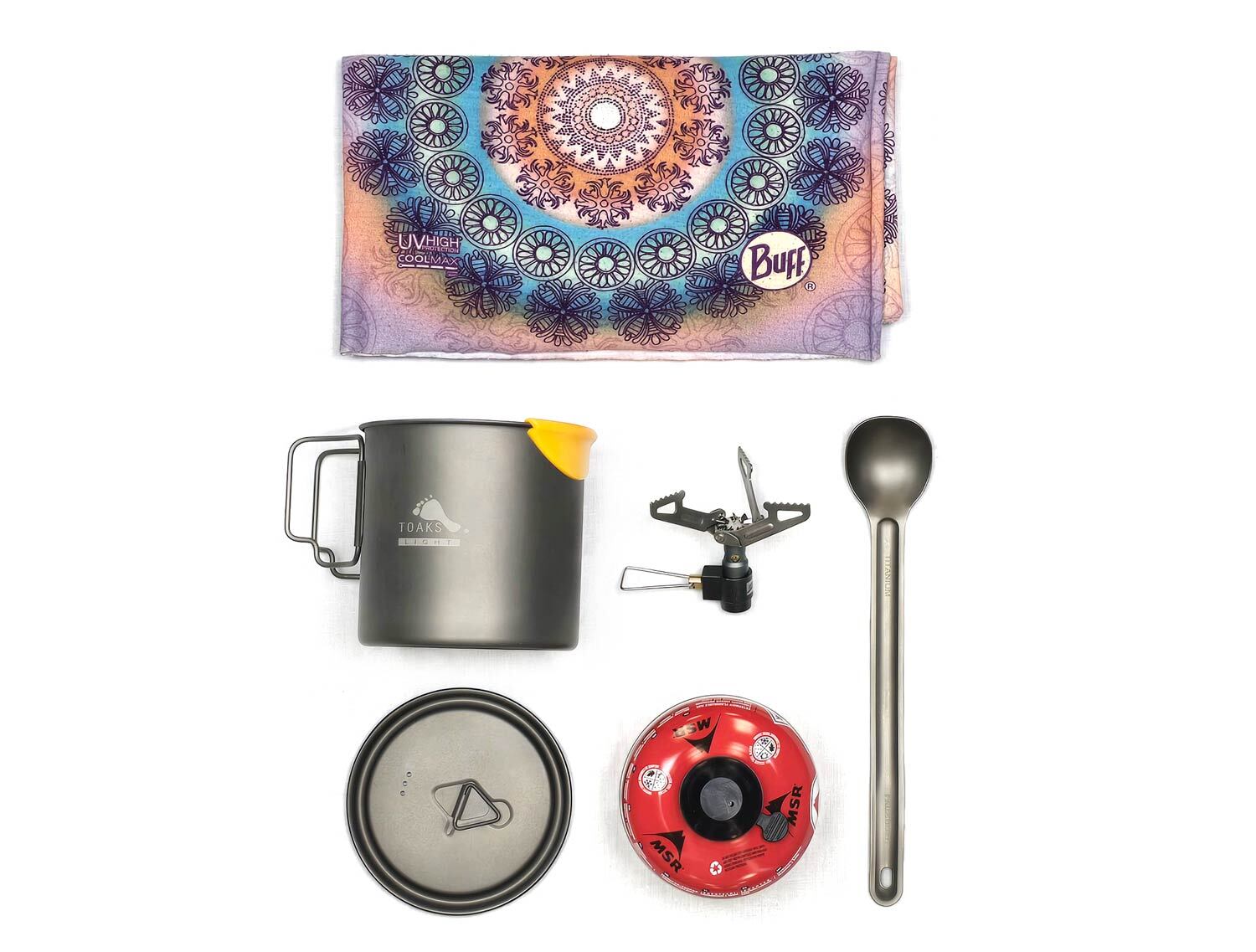
BRS 3000-T Stove — 26g
Incredibly small and incredibly light. I’m taking a bit of a punt with this one. I usually reach for the SOTO Windmaster or MSR PocketRocket Deluxe, but in the spirit of shaving grams, I'm giving the BRS 3000-T a go. It's unfathomably tiny and weighs next to nothing. Since I’m not planning to do much actual cooking, just the occasional dehydrated meal and a morning brew, it feels like the right time to test this little stove in the field.
TOAKS Titanium Pot (650ml) — 78g
Compact, simple, and just the right size for a solo trip with minimal cooking. I’ll be skipping my usual luxury item (a double-walled mug) and using this as both pot and cup, with a Snow Peak hot-lip slipped on the side. Apart from the spoon, the whole cook system nests inside.
Snow Peak HotLips (Single) — 3g
A small but genuinely helpful addition. It slips onto the rim of my pot, making it possible to drink straight from the pot after boiling without burning my lips. Especially handy when I’m skipping a separate mug, this little piece of silicone turns my cook pot into a safe, usable cup.
Vargo Titanium Long-Handle Spoon — 14g
Long enough to reach the bottom of a dehydrated meal pouch, and incredibly light. A no-nonsense bit of cutlery I take on almost every trip.
Mini Bic Lighter — 11g
Tiny, reliable, and does the job. This one lives in my cook kit, with a spare stashed in my first aid kit.
MSR IsoPro Canister (8oz) — 200g
With my minimal cooking plans, this should last the week. If I run low, the West Highland Way has enough resupply options that I can pick up another canister en route.
PackTowl Personal Towel (Small) — 20g
This lives in my cook kit, mostly to stop the gas canister from rattling and leaving residue on my pot. It’ll double as a towel for drying off after a swim and for wiping down tent condensation in the mornings.
Hydration — Total Weight: 188g
CNOC Vecto Water Container (2L, 42mm) — 82g
I’ve been using this same hydration system since CNOC first came out, and I don’t see any reason to change it. The Vecto pairs with the BeFree for collecting, filtering, and carrying extra water to camp. Durable, easy to fill, and rolls up when empty.
Katadyn BeFree Filter 0.5L — 72g
The BeFree has been my go-to filter since I started using it on the TGO four years ago, and the updated version is even better. The new silicon mouthpiece and integrated activated carbon filter enhance what was already an iconic piece of ultralight kit.
CNOC Hydriam Collapsible Flask (750ml, 42mm) — 34g
I wanted something I could attach the BeFree filter to, and this provides an extra-soft bottle I can drink from on the move. It’s light, simple, and works well as a secondary bottle.
Lighting & Electronics — Total Weight: 750g
Petzl Actik Core 600 Headlamp — 88g
Light, reliable, and it's already done hundreds of miles with me. It’s USB rechargeable, which makes it easy to top up on the go. Realistically, walking the West Highland Way in July, I doubt I’ll even switch it on, but it’s better to have it and not need it.
Samsung Galaxy S24 Ultra — 233g
Phones often get overlooked on kit lists, but I want this list to be as accurate as possible. I’ll mainly use it for photos and audiobooks. Navigation will primarily be handled on my watch, which helps preserve the phone's battery. It’ll stay in flight mode for most of the day, only switching it on at camp to check in with my partner and parents.
Garmin InReach Mini 2 Satellite Communicator — 99g
Probably not essential on the West Highland Way, as the signal is generally decent, but I carry this to stay in touch with loved ones, and the SOS function is a good just-in-case backup. It brings peace of mind and is good practice on any multi-day walk. Since I already own it, it’s coming with me.
Suunto Charging Cable — 26g
My watch will need charging once during the walk, and this is the cable to do it.
USB-C Quad Port Plug — 61g
Two USB-A and two USB-C ports enable me to charge everything: phone, watch, power bank, and InReach, all from a single plug. When staying in hostels, plugs are a hot commodity, so this ensures I can charge multiple devices at once.
1x USB-A to USB-C & 2x USB-C to USB-C Cables — 38g
All 1 metre long. I’ve tried shorter cables to save weight, but it's frustrating trying to use your phone when it's tethered six inches from the wall.
Nitecore NB10000 Gen 2 Power Bank — 153g
I chose the Gen 2 over the Gen 3 because it includes a USB-A port, which I still need. This power bank provides me with two and a half full phone charges and can also top up my other devices during wild camping trips.
Wireless Earbuds — 38g
For listening to Tristan Gooley’s The Walker's Guide to Outdoor Clues and Signs when the conversation runs dry, or for drowning out snorers in hostels.
Montbell U.L. Pouch S — 14g
Keeps all my electronics together. When travelling to and from the trail, this stays at the top of my pack so I can use devices and charge them when that's an option.
Hygiene — Total Weight: 229g
Denttabs Bamboo Toothbrush — 8g
Lightweight and full-sized, not cut in half.
Denttabs Toothpaste Tablets (x14 – Strawberry) — 5g
Enough for morning and evening brushing for the whole trip. Denttabs let you bring exactly what you need; no more, no less.
DirtSaw Deuce #2 Trowel — 16g
Sturdy enough to dig through roots and rocky soil when nature calls.
Toilet Roll — 40g
Pretty self-explanatory.
Sea to Summit Wilderness Wash (50ml) — 60g
Since I know I’ll have access to at least three showers along the way, a luxury, I’m bringing a small bottle of biodegradable soap to make the most of it.
First Aid & Protection — Total Weight: 114g
Zinc Oxide Tape (24g)
Essentially human duct tape. Great for blisters, cuts, minor sprains, and any other minor injuries that need to be held together. I’ve wrapped about a quarter of a roll around a bit of cardboard. It sticks to itself and doesn’t come off easily, even when wet.
Mini Scissors (20g)
Compact but effective. Used for cutting tape, trimming loose gear, or whatever else needs snipping.
Surgical Cotton (small amount, included with scissors)
Ibuprofen (1 strip) (4g)
For inflammation, pain, or sore muscles.
Imodium (1 strip) (3g)
Just in case.
Antihistamine (1 strip) (3g)
For bites, stings, or any mild allergic reaction.
I’ve grouped these as my core first aid kit, nothing fancy, and nothing I don’t know how to use. Just the essentials for the kind of issues I’m most likely to face on a week-long walk. I know some might be shaking their heads at how minimal it is, but from experience, this setup has always been enough. It’s focused, familiar, and avoids carrying extra weight for things I’m unlikely ever to use.
Pocket Smidge Insect Repellent (37g)
This small bottle may be upgraded to a full-size one depending on the forecast, but it's here to keep the midges at bay. A must in the Highlands.
Sea to Summit Ultra-Fine Mesh Headnet (16g)
It would be overly optimistic not to bring this. It’s tiny, weighs next to nothing, and I’d much rather have it and not need it than not have it at all.
Lifesystems Compact Tick Tweezers (7g)
Midges are annoying, but ticks can be dangerous. These are on my house keys and always in my pack, just in case.
Worn Clothing — Total Weight: 1346g
Smartwool Hike Targeted Cushion Ankle Socks — 43g, Women's Hike Targeted Cushion Ankle Socks — 40g
Smartwool socks remain soft, breathable, and cushioned even after hundreds of miles, making them my go-to hiking sock.
SAXX Mesh Boxer Briefs — 74g
I’ve written a love letter to SAXX elsewhere, so I’ll keep it short: I never, and I mean never, go hiking without a pair of these on. The BallPark Pouch has genuinely revolutionised long-distance walking comfort for me.
Suunto Vertical Titanium Solar Watch — 72g
A fancy bit of tech, but one I rely on every time I hike. It’s great to see all the stats at the end of the day, but its real value is in navigation. Having my route on my wrist means I’m not constantly digging out a map or draining my phone's battery just to check where I am.
Turbat Maya Hood — 213g
Arguably my favourite bit of kit for 2025. It’s a lightweight, breathable top with excellent ventilation options. The main fabric is tough and structured, while the back, sides, and sleeves are made from stretchy, breathable panels that allow air to flow freely. It has one zippered chest pocket and good venting options. I’ve opted for full-length sleeves for both sun and midge protection, and the hood keeps the sun off my face in hot weather. It’s a sun hoody done right.
Outdoor Research Ferrosi Pants — 284g
Lightweight, breathable, and with an almost ridiculous amount of stretch. Great for warm weather and ideal for full sun, with added insect protection. I’ve packed shorts as well, but I expect to wear these most days.
Topo MTN Racer 4 Shoes — 660g
I’ve put around 40 miles into these before the trip, so I know they work for me. They’ve got a solid grip, a responsive midsole, and a breathable but robust upper.
Rain Gear — Total Weight: 279g
Montane Minimus Lite Jacket — 224g, Women's Minimus Lite Jacket — 200g
Very light and very packable. I’m not expecting much rain, so for now I’m keeping things minimalist. If the forecast changes closer to the date, I may swap this out for the more robust Outdoor Research Foray II Jacket; however, as it stands, this strikes the right balance of weight and function.
Enlightened Equipment Rain Wrap — 55g
As mentioned above, I’m not packing for heavy rain, but this rain kilt provides decent lower-body protection while remaining breathable. I’m not a fan of waterproof trousers, so this is the ideal compromise for me. Again, if the weather looks worse than expected, I’ll likely upgrade to the Outdoor Research Foray 3L Pants.
Additional Clothing — Total Weight: 455g
Smartwool Hike Targeted Cushion Ankle Socks — 43g, Women's Hike Targeted Cushion Ankle Socks — 40g
These will be rotated daily: one pair on, the other washed and drying on the back of my pack. It's a simple system that works well.
SAXX Boxer Briefs (Spare Pair) — 74g
I’ll switch to these halfway through the trip. Out of courtesy to the Scottish tourist industry, these won’t be drying on the outside of my pack.
OMM Core Hoodie — 122g
Very light, very breathable, I never go on a multi-day trip without it. It’s not the most durable midlayer, but it’s warm, quick drying, and lives up to its name by being a core part of my hiking kit. I’m forgoing a puffy this trip; between this and my minimalist rain jacket, I’ve got the insulation I’ll need if temperatures dip unexpectedly.
Rab Talus Light Shorts — 97g, Women's Talus Light Shorts —91g
I can see myself reaching for these along the Loch Lomond section. Good to have on hand, even if they’re just used for camp wear or for doing washing.
Smartwool Active Ultralite Tee (Short Sleeve) — 119g, Women's Active Ultralite Short Sleeve Tee — 102g
This is primarily for sleeping, but I may also wear it during the day. The merino/synthetic blend stays comfortable and dries quickly, even when you’re pushing yourself hard.
Food & Drink — Total Weight (start): 834g
Gossamer Gear Snack Sack (Roll-top Food Bag) — 37g
A lightweight Tyvek bag to keep all my food in one place. The roll-top closure allows it to compress or expand depending on its contents, making it ideal as I eat through my supplies or top up at shops along the way.
Dehydrated Meals & Breakfasts:
Lyo Goulash — 102g
Real Turmat Taco Bowl — 129g
Real Turmat Fruit Muesli (132g)
Real Turmat Chocolate Muesli — 132g
Hot Drinks: 7 x Earl Grey Tea Bags — 14g
Two a day. I prefer Earl Grey to standard black tea when I don’t have the luxury of milk.
Snacks: 8 x Snickers Bars — 288g
Snickers have long been my go-to trail snack: calories, sugar, fat, and chocolate all in one, what more do you need?
I’ll group all this as my starting food load. I don’t have a strict daily meal plan. This is a flexible trip with plenty of food options along the route. I’ve packed two breakfasts and two evening meals to get me started, and I’ll resupply as needed along the way.
Final Thoughts
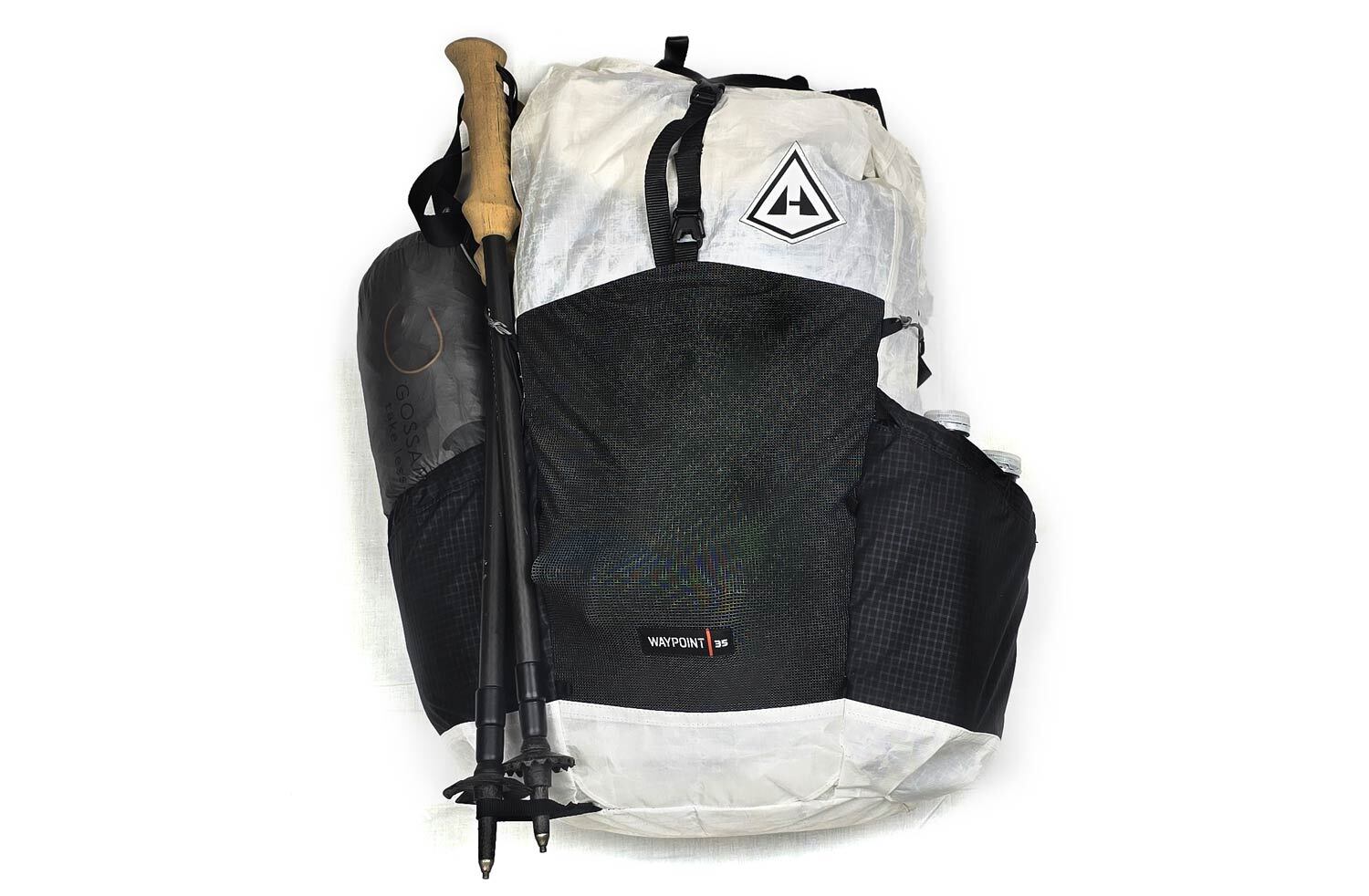
That brings my full pack weight to 7.21 kg, including 1.28 kg of consumables (food, gas, etc.) and 1.46 kg of worn items. My base weight lands at 4.46 kg, which I’m pleased with for a week-long summer trek that includes both wild camping and accommodation.
It’s worth noting this total doesn’t include water, which I’ll carry depending on the terrain and conditions or the inevitable bottle of whisky, which somehow always finds its way into the pack.
This kit is the result of years of refining, testing, and refining, and I feel confident heading back onto the West Highland Way with a setup that’s dialled in, functional, and genuinely lightweight without sacrificing comfort or safety. Every item in my pack earns its place. If I don’t use it regularly, it doesn’t come. That mindset, more than any spreadsheet, is what keeps my pack light.
Below is a detailed breakdown of this loadout via LighterPack, allowing you to examine the numbers in more detail or use it as a base for building your kit.
 |
||
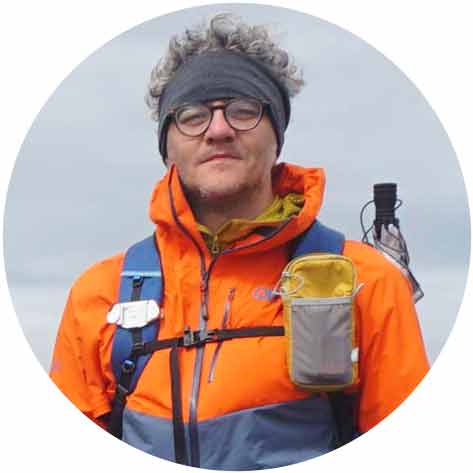 |
||
| Andy Neil |
||
|
Andy has been a keen long-distance hiker and wild camping enthusiast since he completed the Cleveland Way in 2015. Since then, he has walked thousands of trail miles all over the UK and is an active member of the Wild Camping UK community, being an admin of the largest wild camping community on Facebook. He strongly advocates for responsible wild camping and believes it is important to leave no trace when camping in the wilderness. He joined the UOG team in 2021 and works as a website developer and content creator. |
||
Eight years ago, I first hiked the West Highland Way. Since then, I’ve clocked up thousands of miles on trails all across the UK, learning, refining, and stripping back my kit with each trip. So, returning to the Way this summer, I’m walking it with more experienced legs and a much more dialled-in, ultralight setup. For a full, itemised breakdown of my kit, including weights and categories, scroll down to the LighterPack link at the end of this article.

